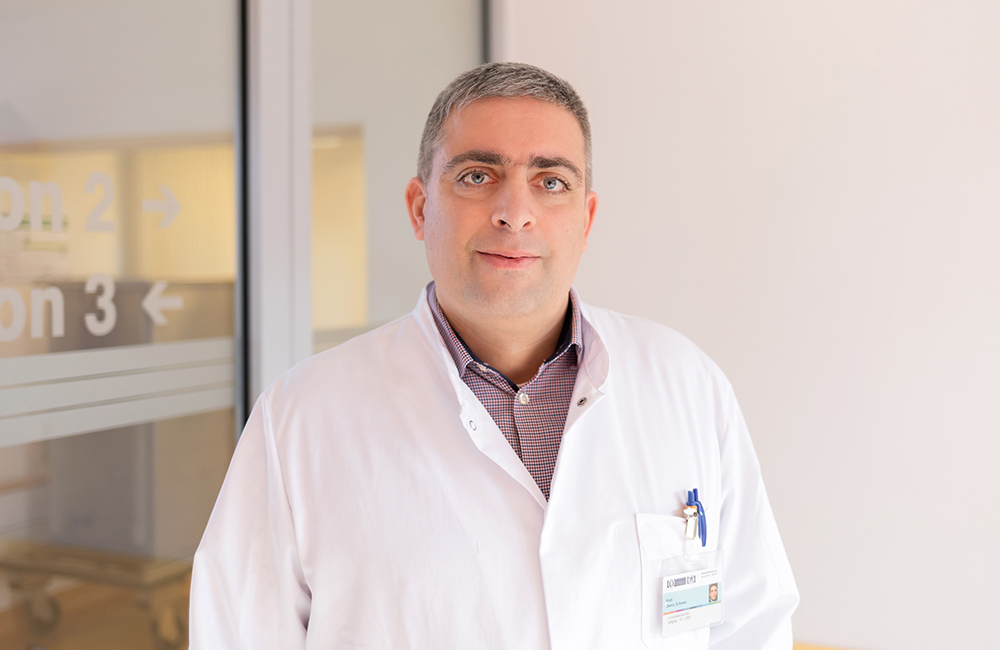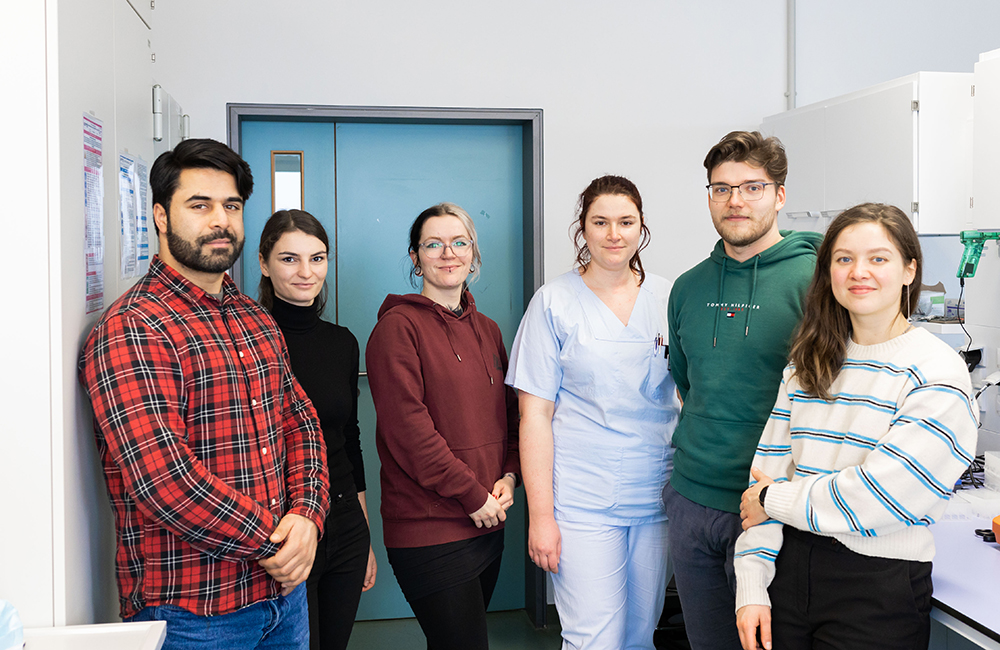Unmasking Cancer Cells
New targets for the development of improved immunotherapies against childhood leukemias
Scientists at Magdeburg University Medical Center are gaining important insights for the development of new immunotherapies for the treatment of acute leukemias, the most common childhood cancer.
The research area "Translational ALL Research" of theUniversitätskinderklinik Magdeburg headed by Clinic Director Prof. Dr. med. Denis Schewe is researching novel immunotherapy approaches for the treatment of acute lymphoblastic leukemias (ALL) in children and adolescents. The researchers are focusing on the evasion and camouflage mechanisms with which tumor cells repeatedly manage to escape the body's own defenses. The idea is to use state-of-the-art immunotherapies to help the immune system recognize, attack and destroy malignant cancer cells. The aim is to develop improved therapeutic strategies in order to reduce or even replace the use of toxic chemotherapies. The working group - together with its Kiel partners - is providing new findings for this, which were published in four important scientific publications in 2022.

Photo: Prof. Dr. med. Denis Schewe, Clinic Director of the University Children's Hospital Magdeburg.
Photographer: Sarah Kossmann/UMMD
Acute lymphoblastic leukemia is the most common malignant disease of the hematopoietic or lymphatic system in children. The disease arises from degenerated precursor B or T cells (B- or T-ALL, respectively). Although therapeutic strategies have improved by optimizing chemotherapies for ALL and there is a good chance of cure, therapy is not successful in 20 percent of those affected. "In all cases, the therapy is toxic and accompanied by more or less pronounced acute as well as long-term side effects. There is an urgent need for novel immunotherapies. This can reduce the toxicity of the therapy and treat disease relapses that are no longer achievable by chemotherapy alone. In particular, there are virtually no immunotherapy approaches for T-ALL to date." explains Prof. Schewe, who has already been conducting research in this field for more than ten years. "Our goal is to create the preclinical basis for a new substance, a new therapy combination or a new immunotherapy to be tested in clinical trials."
The research group is investigating different variants of immunotherapies. According to the pediatric oncologist, one strategy is the use of so-called monoclonal antibodies - a group of artificially produced proteins that attach to the surface of cancer cells, activate immune cells such as macrophages, and thereby destroy the leukemia cells in a targeted manner. "We were able to show that the surface receptors CD38 and CD47 on leukemic cells of patients with T-ALL are attractive targets for antibody therapy," explains Prof. Schewe, adding that the combination of two antibodies in particular showed promising results. One of the antibodies blocks a so-called immune checkpoint. The specialist in pediatric and adolescent medicine explains: "Checkpoints are molecules that slow down the immune system and thus prevent the immune cells from damaging the body's own tissue. Cancer cells increase the braking effect and thus protect themselves from the immune system. This mechanism can be reversed with special drug inhibitors known as checkpoint inhibitors. The immune cells can then effectively fight the tumor again. We have succeeded in curing relapses of T-ALL in a preclinical model using such an approach."
The modification of antibodies is also a therapy option that Prof. Schewe's team is investigating scientifically. Through targeted changes in the molecular structure, it is possible to mediate immune effects to the defense system and thus better activate the phagocytes. "The fact that phagocytes can play a significant role in immunotherapies for ALL in the model is one of our most important findings in recent years," explains Prof. Schewe.
In collaboration with the Universität Kiel and the company OSE Immunotherapeutics in Nantes, France, Prof. Schewe is testing further therapeutic strategies for difficult-to-treat leukemias. The corresponding work on the therapy of interleukin-7 receptor-positive ALLs was awarded the prestigious ASH Abstract Achievement Award at the American Cancer Congress.

Foto: AG Prof. Schewe im Forschungslabor.
Fotografin: Sarah Kossmann/UMMD
The research team has already been able to demonstrate the effectiveness of some of these therapeutic approaches in the laboratory, so Prof. Schewe is confident that they could be in clinical use as early as five years from now:"We have already succeeded in completely eliminating leukemias in experimental animals. Our goal now is to transfer these experimental results to patients." In order to achieve this, the pediatric oncologist relies on interdisciplinary cooperation with adult physicians and research associations for immunology and inflammation research, such as the Research Training Group 2408 on the campus of the University Medical Center Magdeburg, but also national and international consortia.
Prof. Dr. med. Denis Schewe moved from Christian Albrechts University Kiel to Otto von Guericke University Magdeburg in 2021 and has since occupied the professorship for pediatric and adolescent medicine. Born in Munich, he completed his medical studies at the LMU Munich, where he also later earned his doctorate. For his practical training, he worked at the renowned Harvard Medical School in Boston, among other places. With a postdoctoral fellowship from the Deutschen Krebshilfe e. V. he also made a stop at the Department of Biomedical Sciences at the Universität Albany (State University of New York) at the Mount Sinai Medical Center in New York City. He holds the additional designation "Emergency Medicine" and the focus designation "Pediatric Hematology/Oncology".
The research of the working group "Translational ALL Research" is supported, among others, by grants from the Deutschen Forschungsgemeinschaft (DFG), der Deutschen Krebshilfe e.V., der José-Carreras-Stiftung und der Wilhelm Sander-Stiftung.
Publiccations
- The IL7R-Antagonist OSE-127 Blocks Acute Lymphoblastic Leukemia Development Via a Dual Mode of Action, https://ash.confex.com/ash/2022/webprogram/Paper162261.html
- Combining daratumumab with CD47 blockade prolongs survival in preclinical models of pediatric T-ALL, in: Blood, American Society of Hematology; https://doi.org/10.1182/blood.2021014485
- Venetoclax enhances the efficacy of therapeutic antibodies in B-cell malignancies by augmenting tumor cell phagocytosis, in: Blood Advances, American Society of Hematology, https://doi.org/10.1182/bloodadvances.2022007364
- Preclinical Evidence for the Efficacy of CD79b Immunotherapy in B-cell Precursor Acute Lymphoblastic Leukemia, in: HemaSphere, https://journals.lww.com/hemasphere/Fulltext/2022/08000/Preclinical_Evidence_for_the_Efficacy_of_CD79b.5.aspx
Scientific Contact
Prof. Dr. med. Denis Schewe, Direktor der Universitätskinderklinik Magdeburg, Tel.: 0391/67 24000, Mail:






